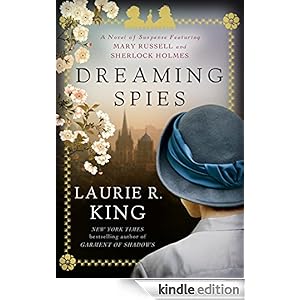(I received a free e-ARC for this book from
Net Galley.)
Fair warning: The next handful of books I review will be titles I picked up to see if I could use them in my college-level classes. As I'm a marketing professor, that means these books will be nothing like my normal selections of urban fantasy, romance, mystery or YA. Feel free to walk away briskly.
"Business Adventures is truly financial journalism at its liveliest and best."
The liveliest of financial journalism, huh? That sounds, err, fascinating.
The truth is John Brooks is a great storyteller even if his subject matter isn't the typical stuff of campfire recitations. The professional reviews of Business Adventures also compliment Brooks on his prose (a fair assessment) and his insight (also fair). Business Adventures is likely a great read for a well-educated Baby Boomer with a strong personal interest in business machinations and the financial world. Specifically, I found the essays about the founder of Piggly-Wiggly, the creation (and failure) of the Edsel, and the court definitions of insider trading to be fascinating. I have absolutely no background in finance (three communication degrees), so you don't need to be a Wall Street Whiz to appreciate these stories.
The twelve classic tales of Wall Street were originally published in the New Yorker in the late 1950s and throughout the 1960s, so let's break down those components to see if this book would be a good fit for my students as compared to the group I've already identified as as a good audience for this book (well-educated Baby Boomers who like finance).
a) published in The New Yorker
Google allows you to filter your search by reading level. (Did you know that? I didn't before I began this review.) I went looking for information on reading level because more than once in reading Brooks' essays I had to stop and think about the meaning of a word. While I don't pretend to be a walking dictionary, I read a LOT. I also like to think that I have a strong vocabulary. I KNOW I have a stronger vocabulary than many of my students, so I wanted to find an objective measure of how difficult it would be to read New Yorker essays.
Take a look at this table to see a comparison of news sites and reading levels. Think of basic as elementary-level texts, advanced as technical or scholarly articles and intermediate as everything in between. (Those descriptions came from here.)
 |
| The reading level percentages were generated on 1/18/15. |
So, in today's world,
The New Yorker is more difficult to read than general news sites but not as difficult to read as specialized financial publications. What's even more interesting to me is how much those numbers have changed in the time Google has made this filter available. Below is a chart of reading levels from December 2014 as reported in
this blog post.
 |
| Sherk didn't report the numbers for The New Yorker. |
If the reading level has decreased that much in four years, it's conceivable that essays written for a print publication in the 1950s and 1960s had an even higher reading level then the same publication does today. But, obviously, I have no data to support that assertion. It's based on my subjective comparison and a familial trait for speculation.
But even at today's reading level measures, essays from The New Yorker could be a stretch for students accustomed to reading text measures and tweets.
b) published in the 1950s and 1960s
This is, likely, the biggest stumbling block for using the book in my classrooms. These stories are so much older than my students that they seem like they're written in another language. In essays related to the New York Stock Exchange, parts of the tales are dependent on how far behind the Exchange can get on reporting current trading prices. For a generation of students who can find scrolling stock prices at the bottom of a television screen or on a monitor in business school buildings, this challenge is difficult to comprehend. Similarly, for readers who can finding breaking news at their thumb-tips on their mobile devices, the idea of waiting for information from a press release to trickle through the public before making stock trading decisions on that information seems truly foreign. I'd almost like to see an annotated version of these essays with comparisons and translations today's world of information technology. For instance, it would be useful to know how long after a 1964 press conference a news agency would publish or air a story, so that my students could see the time lag (as compared to today's industry events being live-tweeted) and then understand how those present truly would be better informed than the general trading public.
In summary, while I believe there's an obvious target market for this work and I enjoyed reading several of the essays, this book is not a good choice for my classrooms.

 How fabulous is that?
How fabulous is that?







